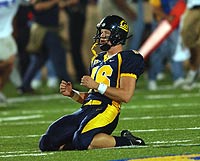Berkeleyan
Achievement: It’s not all on the field
Grad students apply sports experiences to their research on athletes and academics
![]()
| 14 October 2004
In the fall semester of her senior year at UCLA, the holder of the 2002 national women’s collegiate discus title, Chaniqua Ross, found herself, like many of her classmates, “in a panic” about what to do once she graduated. Ross decided to check out graduate programs in education, and once on the Berkeley Graduate School of Education website, as she tells it, “happened to keep clicking” until she came upon a listing that grabbed her by the collar.
“Wow, this is me!” she recalls thinking. So “me,” in fact, that “it was do or die” for Ross. “I didn’t apply anywhere else.”
The offering that so captivated the Bruin was “Athletes and Academic Achievement,” a master’s-degree program focusing on the experiences of student athletes and how best to foster their academic success. For Ross, the Berkeley program — a concentration within the graduate school’s Language Literacy, Society, and Culture area of study — offered a way to build toward her career goal (academic support for student athletes like herself) and to apply, in the process, her long and intense experience in competitive sports, rather than leaving it all behind once she collected her undergraduate diploma.
Her all-eggs-in-one basket gamble worked out. A sociology and African American studies major with a 3.45 GPA, Ross was accepted into the intensive, one-year graduate program at Berkeley. Her cohort of 9 students included a significant contingent from rival Cal (two football players, one student each from the women’s basketball, soccer, and track-and-field squads, and the manager of the women’s basketball team), a Stanford water polo player, and a former Columbia University springboard and platform diver and a swimmer from UCLA. (The current class of 18, likewise, consists of nine recent varsity athletes from Cal, a sports writer, a basketball coach, and seven athletes from other schools.)
Applying personal experience
Collectively, grad students in the Athletes and Academic Achievement program have a wealth of personal experience in high school and college sports — experience that figures prominently in classroom discussions and students’ required research projects.
“We study important theory, for instance on athletic-academic identity. But we’re also fortunate that students bring in experience from their own lives as student athletes, which greatly enriches the program,” says Professor of Education Herb Simons, a longtime sports fan who started the Athletes and Academic Achievement concentration eight years ago. “I developed the program so that athletes would have the opportunity to reflect upon their athletic experiences and apply that knowledge to education and teaching.”
 Tyler Fredrickson, who graduated last spring from the Athletes and Academic Achievement program, was a standout football player for Cal. (Steve Grayson photo) |
Former Cal basketball player Courtney Johnson used her contacts at Miramonte High School, where she coached, to study the role of parental pressure in high-school athletics. Others have investigated how identity formed through athletics affects a student’s academic performance, the experience of African American athletes who are a minority in their sport, the relationship between physical- and academic-skill acquisition, and the extent to which high school counselors and coaches are connecting young inner-city athletes with potential sports scholarships. Ross got entré into the world of pro football through her brother, an NFL player on the Cincinnati Bengals, to interview players about their college experience (about half don’t finish) and what would motivate them to go back to school.
Another student summarizes her research on compliance with the NCAA “20-hour rule,” which prohibits intercollegiate athletes from devoting more than 20 hours per week to their sport. This spurs a discussion among the former student athletes — enlivened, as Ross puts it, by participants’ “absolute insight” into the amount of time that student athletes must devote to their respective sports, versus “what’s on paper and what is perceived by society at large.”
The ‘dumb jock’ image
One of the things “perceived by society at large” is encapsulated in the phrase “dumb jock.” According to Simons and to many of the student athletes themselves, the stigma of “academic inferiority” is one that student athletes contend with constantly, at Cal and elsewhere — regardless of their academic successes and the discipline required to balance a course load and obligations to the team. The average GPA for ’04 incoming students to the Athletes and Academic Achievement program is 3.44, Simons notes — “essentially the same” as the average GPA for incoming students to the School of Education, 3.46.
“Over the years, my involvement with student athletes at Berkeley taught me that these elite athletes are able to transfer the dedication, perseverance, and focus necessary for athletic success to academics and become successful students,” he says.
Many Athletes and Academic Achievement graduates, in fact, are now poster children for academic success. One of its earliest graduates, Derek Van Rheenan, a former Cal soccer player, went on to get a PhD; he now heads Berkeley’s Athletic Study Center (where students in the program frequently do internships). Courtney Johnson parlayed her master’s degree and athletic experience into an assistant director position at the California Interscholastic Federation, which oversees high school sports for the state; Ross graduated in June and within two months started as director of academic support for student athletes at University of San Francisco.
“I want to see athletes to play a more central and positive role in education from elementary school to the university,” notes Simons. “That is happening. Many of our students go on to careers as teachers, coaches, and academic advisers for student athletes.”

